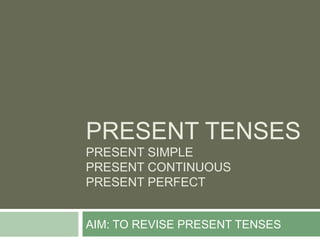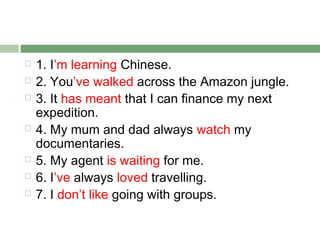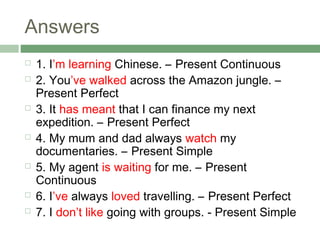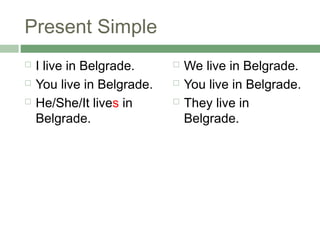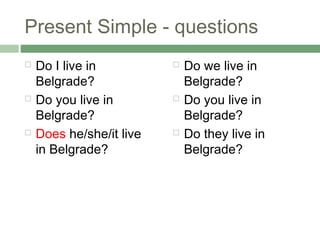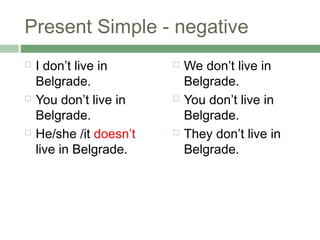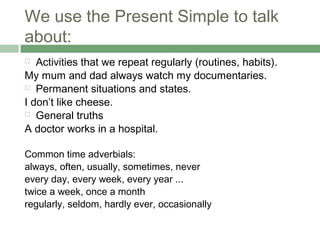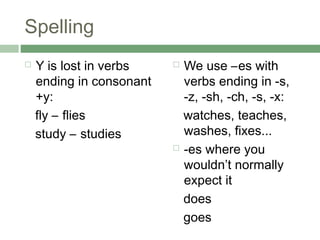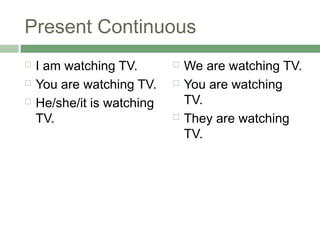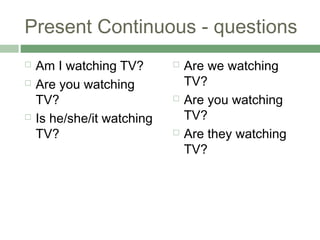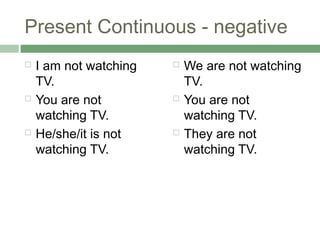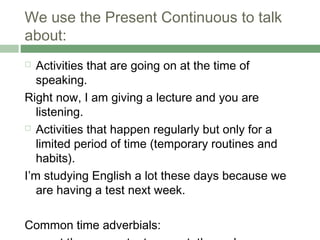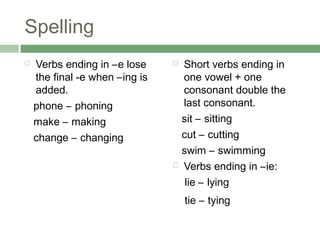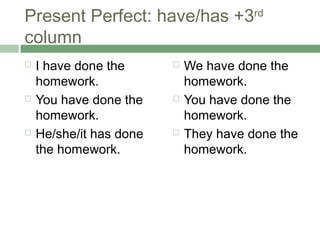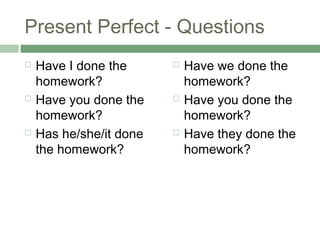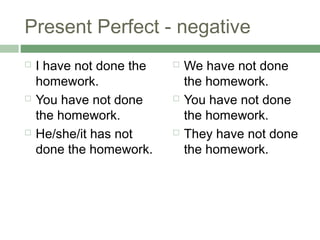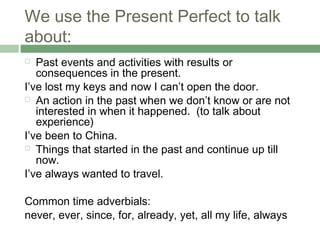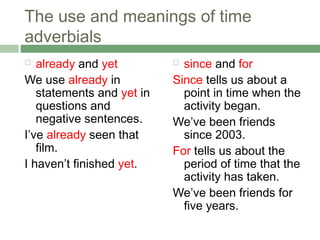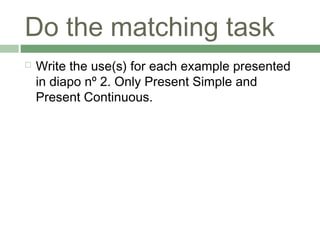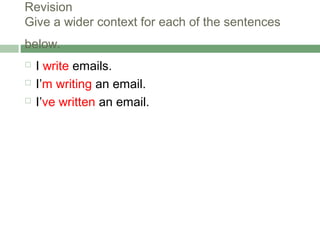Lesson 5 present tenses
- 1. PRESENT TENSES PRESENT SIMPLE PRESENT CONTINUOUS PRESENT PERFECT AIM: TO REVISE PRESENT TENSES
- 2. ’é© 1. IŌĆÖm learning Chinese. ’é© 2. YouŌĆÖve walked across the Amazon jungle. ’é© 3. It has meant that I can finance my next expedition. ’é© 4. My mum and dad always watch my documentaries. ’é© 5. My agent is waiting for me. ’é© 6. IŌĆÖve always loved travelling. ’é© 7. I donŌĆÖt like going with groups.
- 3. Answers ’é© 1. IŌĆÖm learning Chinese. ŌĆō Present Continuous ’é© 2. YouŌĆÖve walked across the Amazon jungle. ŌĆō Present Perfect ’é© 3. It has meant that I can finance my next expedition. ŌĆō Present Perfect ’é© 4. My mum and dad always watch my documentaries. ŌĆō Present Simple ’é© 5. My agent is waiting for me. ŌĆō Present Continuous ’é© 6. IŌĆÖve always loved travelling. ŌĆō Present Perfect ’é© 7. I donŌĆÖt like going with groups. - Present Simple
- 4. Present Simple ’é© I live in Belgrade. ’é© We live in Belgrade. ’é© You live in Belgrade. ’é© You live in Belgrade. ’é© He/She/It lives in ’é© They live in Belgrade. Belgrade.
- 5. Present Simple - questions ’é© Do I live in ’é© Do we live in Belgrade? Belgrade? ’é© Do you live in ’é© Do you live in Belgrade? Belgrade? ’é© Does he/she/it live ’é© Do they live in in Belgrade? Belgrade?
- 6. Present Simple - negative ’é© I donŌĆÖt live in ’é© We donŌĆÖt live in Belgrade. Belgrade. ’é© You donŌĆÖt live in ’é© You donŌĆÖt live in Belgrade. Belgrade. ’é© He/she /it doesnŌĆÖt ’é© They donŌĆÖt live in live in Belgrade. Belgrade.
- 7. We use the Present Simple to talk about: ’é© Activities that we repeat regularly (routines, habits). My mum and dad always watch my documentaries. ’é© Permanent situations and states. I donŌĆÖt like cheese. ’é© General truths A doctor works in a hospital. Common time adverbials: always, often, usually, sometimes, never every day, every week, every year ... twice a week, once a month regularly, seldom, hardly ever, occasionally
- 8. Spelling ’é© Y is lost in verbs ’é© We use ŌĆōes with ending in consonant verbs ending in -s, +y: -z, -sh, -ch, -s, -x: fly ŌĆō flies watches, teaches, study ŌĆō studies washes, fixes... ’é© -es where you wouldnŌĆÖt normally expect it does goes
- 9. Present Continuous ’é© I am watching TV. ’é© We are watching TV. ’é© You are watching TV. ’é© You are watching ’é© He/she/it is watching TV. TV. ’é© They are watching TV.
- 10. Present Continuous - questions ’é© Am I watching TV? ’é© Are we watching ’é© Are you watching TV? TV? ’é© Are you watching ’é© Is he/she/it watching TV? TV? ’é© Are they watching TV?
- 11. Present Continuous - negative ’é© I am not watching ’é© We are not watching TV. TV. ’é© You are not ’é© You are not watching TV. watching TV. ’é© He/she/it is not ’é© They are not watching TV. watching TV.
- 12. We use the Present Continuous to talk about: ’é© Activities that are going on at the time of speaking. Right now, I am giving a lecture and you are listening. ’é© Activities that happen regularly but only for a limited period of time (temporary routines and habits). IŌĆÖm studying English a lot these days because we are having a test next week. Common time adverbials:
- 13. Spelling ’é© Verbs ending in ŌĆōe lose ’é© Short verbs ending in the final -e when ŌĆōing is one vowel + one added. consonant double the phone ŌĆō phoning last consonant. make ŌĆō making sit ŌĆō sitting change ŌĆō changing cut ŌĆō cutting swim ŌĆō swimming ’é© Verbs ending in ŌĆōie: lie ŌĆō lying tie ŌĆō tying
- 14. Present Perfect: have/has +3rd column ’é© I have done the ’é© We have done the homework. homework. ’é© You have done the ’é© You have done the homework. homework. ’é© He/she/it has done ’é© They have done the the homework. homework.
- 15. Present Perfect - Questions ’é© Have I done the ’é© Have we done the homework? homework? ’é© Have you done the ’é© Have you done the homework? homework? ’é© Has he/she/it done ’é© Have they done the the homework? homework?
- 16. Present Perfect - negative ’é© I have not done the ’é© We have not done homework. the homework. ’é© You have not done ’é© You have not done the homework. the homework. ’é© He/she/it has not ’é© They have not done done the homework. the homework.
- 17. We use the Present Perfect to talk about: ’é© Past events and activities with results or consequences in the present. IŌĆÖve lost my keys and now I canŌĆÖt open the door. ’é© An action in the past when we donŌĆÖt know or are not interested in when it happened. (to talk about experience) IŌĆÖve been to China. ’é© Things that started in the past and continue up till now. IŌĆÖve always wanted to travel. Common time adverbials: never, ever, since, for, already, yet, all my life, always
- 18. The use and meanings of time adverbials ’é© already and yet ’é© since and for We use already in Since tells us about a statements and yet in point in time when the questions and activity began. negative sentences. WeŌĆÖve been friends IŌĆÖve already seen that since 2003. film. For tells us about the I havenŌĆÖt finished yet. period of time that the activity has taken. WeŌĆÖve been friends for five years.
- 19. Do the matching task ’é© Write the use(s) for each example presented in diapo n┬║ 2. Only Present Simple and Present Continuous.
- 20. Revision Give a wider context for each of the sentences below. ’é© I write emails. ’é© IŌĆÖm writing an email. ’é© IŌĆÖve written an email.

